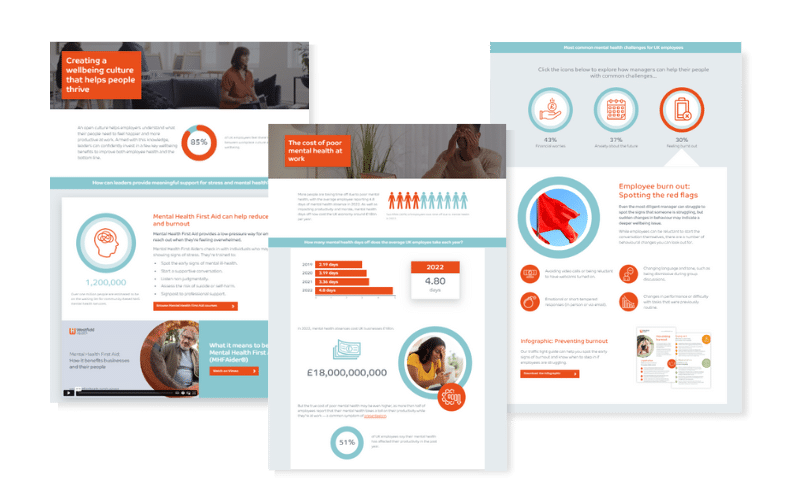Worker mental health is on the decline and shows no sign of slowing, with employees taking more mental health days off over each of the past four years.
Our yearly study of over 2,000 UK workers show a worrying increase in the number of days employees are taking off work due to poor mental health, with absences more than doubling since 2019.
The on-going cost of living crisis is translating into a mental health recession with workers feeling the strain mentally as well as financially. The research reveals that financial worries, anxiety about the future and burnout were the top three issues impacting mental health. In this bitesize blog, we break down the research and explore what employers can do to help.
UK workers are taking more time off due to poor mental health
Two-fifths (40%) of employees took time off due to mental health in 2022 — and the number of mental health days they’re taking has been gradually increasing since our first study in 2019.
Last year, the average employee reported taking 4.8 days of mental health absence — almost a full working week. One in 10 (10%) of workers say they took more than 10 days off due to poor mental health in 2022, signalling a pattern of either recurring or longer-term absences.
Average number of mental health days off taken by UK employees each year:
- 2019 — 2.19 days
- 2020 — 3.19 days
- 2021 — 3.36 days
- 2022 — 4.80 days
How much do mental health absences cost UK businesses?
In 2022, mental health absences cost UK businesses £18bn. Coupled with the impact of poor mental health on productivity and morale, the true cost to businesses could be even higher.
In fact, more than half of workers report that their mental health takes a toll on their productivity while they’re at work — a common symptom of presenteeism.
- 51% of UK employees say their mental health has affected their productivity in the past year.
- 46% of workers use the wellbeing support offered by their employer.
- 32% of people say they still don’t have access to wellbeing support at work.
The mental health crisis continues to accelerate
Almost a third (30%) of workers feel their mental health got worse in 2022 and financial worries topped the list of causes, with 43% of people saying this was a source of stress for them.
The most common reasons for poor mental heath in 2022 were:
- Financial worries – 43%
- Anxiety about the future – 37%
- Feeling burnt out – 30%
- Work stress – 27%
- Stress outside of work – 24%
To break the cycle, business leaders and line managers must work together to step in and provide meaningful mental health support.
Our latest web report includes a variety of resources for managers to tackle stress and burnout in the workplace, but tips to help leaders build a culture of wellbeing that supports their people’s health.
View the report: Understanding the Mental Health Puzzle
The idea of employers being involved in mental health might be an uncomfortable one, but it makes good business sense for them to offer support at a time when the NHS is struggling and absenteeism due to mental health is rising.
Dave Capper – CEO, Westfield Health
